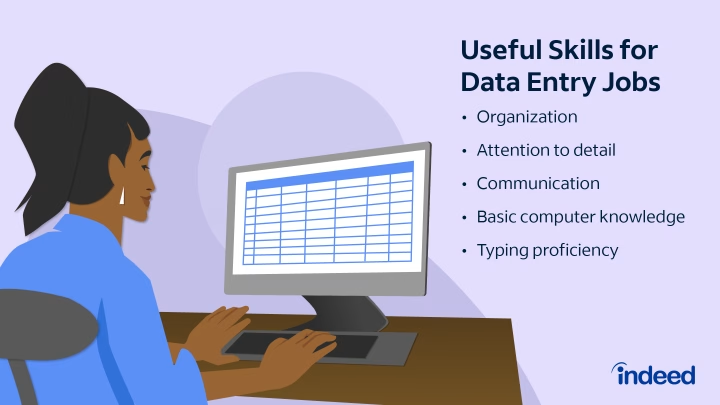Data Entry Remote Jobs: A Comprehensive Guide to Getting Started

Data Entry Remote Jobs In today’s digital-first world, data entry remote jobs have become an increasingly popular work-from-home option. They offer a viable solution for those seeking flexible employment without needing an advanced degree or significant prior experience. From healthcare to retail, a variety of industries rely on accurate data management, making data entry a stable and in-demand profession. This guide will walk you through everything you need to know to pursue a remote data entry job successfully.
What Are Data Entry Remote Jobs?
Data entry remote jobs involve the digitization, organization, and input of information into databases, spreadsheets, or software programs. Employees in this field are tasked with transcribing data from different sources, updating records, and ensuring that information is accurate and up-to-date.
Common tasks include:
- Typing and transcribing documents. Data Entry Remote Jobs
- Inputting data into spreadsheets. Data Entry Remote Jobs
- Organizing and categorizing information. Data Entry Remote Jobs
- Checking for errors and verifying accuracy. Data Entry Remote Jobs

Who Can Work in Data Entry?
While data entry does not require extensive qualifications, certain skills can set you apart:
- Typing Speed and Accuracy: Proficiency in fast and precise typing is essential. Data Entry Remote Jobs
- Attention to Detail: Being meticulous helps ensure data is entered correctly. Data Entry Remote Jobs
- Basic Computer Skills: Familiarity with programs like Microsoft Excel, Google Sheets, or specialized data entry software. Data Entry Remote Jobs
- Organization: Managing data systematically prevents errors and maintains workflow efficiency.
Qualifications vary, but most entry-level roles only require a high school diploma or equivalent. Training courses can also boost your resume by showing that you have developed specific skills. Data Entry Remote Jobs
Types of Data Entry Jobs
The realm of data entry covers various job types, each catering to different preferences and skill sets:
- Basic Data Entry: Involves simple tasks like entering data into spreadsheets or documents.
- Transcription: Includes listening to audio files and typing out what you hear, often for medical or legal professionals. Data Entry Remote Jobs
- Data Processing: Involves processing raw data and converting it into a usable format.
- Data Cleansing: Ensures that existing data is accurate and free from errors or duplicates. Data Entry Remote Jobs
Popular Industries Hiring for Data Entry
1. Healthcare:
- Transcribing medical records, billing data, and patient information is a large part of healthcare data entry. Data Entry Remote Jobs
2. Finance:
- Data entry jobs in finance often include inputting figures, processing financial transactions, and maintaining records.
3. Retail:
- Handling inventory data, order processing, and customer details. Data Entry Remote Jobs
4. Education:
- Inputting student records, test results, and other academic data. Data Entry Remote Jobs
5. Technology:
- In tech companies, data entry can involve inputting code snippets, tracking development logs, and managing databases.
Pros of Working in Data Entry Remotely
- Flexibility: You can set your own hours and work from the comfort of your home.
- Accessibility: Minimal barriers to entry make this an ideal job for those looking to start their remote work journey.
- Low Initial Investment: Unlike many jobs, data entry often requires just a computer and basic software. Data Entry Remote Jobs
Challenges of Remote Data Entry Work
Despite the perks, remote data entry has its share of challenges:
- Repetitive Tasks: Entering data can become monotonous over time.
- High Accuracy Demands: Small mistakes can have significant repercussions.
- Potential Scams: Not all data entry job postings are legitimate; it’s essential to be cautious.
How to Spot Legitimate Data Entry Jobs
To ensure you’re applying to genuine positions, keep the following in mind: Data Entry Remote Jobs
- Avoid Jobs That Ask for Upfront Fees: A reputable job should not require payment from you.
- Verify the Company: Check reviews and use platforms like Glassdoor or the Better Business Bureau to confirm legitimacy. Data Entry Remote Jobs
- Trustworthy Platforms: Stick to well-known job boards such as FlexJobs, Remote.co, or Indeed.
Top Platforms for Data Entry Job Hunting
- Upwork: A freelancing platform where you can bid on data entry projects.
- Freelancer: Another freelance site with numerous data entry job postings.
- Fiverr: Great for those looking to offer data entry services as a freelancer.
- FlexJobs: Specializes in remote and flexible job opportunities, including part-time and freelance data entry.
- Company Career Sites: Some businesses advertise openings directly on their official websites.
Tips for Landing a Data Entry Remote Job
- Customize Your Resume:
- Highlight relevant skills like typing speed, accuracy, and any prior experience with data management software. Data Entry Remote Jobs
- Apply Selectively:
- Focus on jobs that align with your expertise and interest to increase your chances of success.
- Build a Portfolio:
- If possible, compile samples of your previous work or mock data entry tasks to showcase your abilities. Data Entry Remote Jobs
Essential Tools for Remote Data Entry
To excel in a remote data entry role, consider having:
- Software: Microsoft Office Suite, Google Workspace, and sometimes specialized data entry platforms like QuickBooks for accounting tasks. Data Entry Remote Jobs
- Reliable Computer: A device capable of handling prolonged use without lag.
- Internet Connection: Stable, high-speed internet is crucial for smooth performance.
- Data Backup Solutions: Services like Google Drive or external hard drives to ensure data safety.
Best Practices for Success in Data Entry
- Maintain Accuracy: Double-check your entries and use data validation techniques.
- Manage Your Time: Break your workload into manageable segments to avoid fatigue and mistakes.
- Stay Organized: Keep a tidy digital workspace and use folders or labeling systems.
How to Stay Productive in a Data Entry Role
Setting Achievable Goals: Create daily or weekly targets to keep on track. Data Entry Remote Jobs
Ergonomic Workspace: A comfortable chair, desk, and keyboard setup can make long hours manageable.
Limit Distractions: Work in a quiet space or use noise-canceling headphones if necessary.
Success Stories in Remote Data Entry
Sarah’s Journey: A stay-at-home parent who started part-time data entry to supplement family income. With a focus on accuracy and reliability, she built a steady client base and now enjoys flexible hours and stable earnings.
Tom’s Experience: After losing his job in retail, Tom transitioned to data entry through an online course. Today, he handles data entry tasks for multiple clients and earns more than in his previous role.
The Future of Data Entry Remote Work
Automation and AI: While automation can handle some data entry tasks, human oversight is still essential for quality control and handling complex data. The industry is evolving with hybrid roles that combine data entry with basic data analysis.
Growing Demand: Data continues to be a cornerstone for decision-making in most industries, maintaining the demand for data entry specialists who can ensure data integrity.
FAQs
1. How much do remote data entry jobs pay? Rates vary but generally range from $10 to $20 per hour, depending on complexity and experience.
2. Are data entry jobs flexible? Yes, many data entry positions offer part-time or full-time flexibility, allowing you to set your schedule.
3. What equipment do I need for data entry? A reliable computer, fast internet, and relevant software programs are typically all that’s needed.
4. How do I avoid scams in data entry? Use trusted job platforms, avoid any role that requires upfront payments, and research potential employers.
5. Can data entry lead to other job opportunities? Yes, many data entry roles can evolve into data analysis, administration, or management positions over time.
6. Is data entry a good fit for beginners? Absolutely. It’s one of the more accessible remote job options, ideal for those starting in the remote work space.




